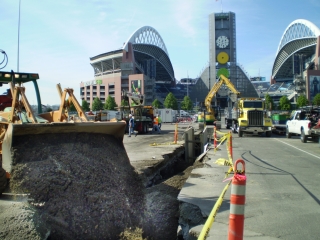|
Subscribe / Renew |
|
|
Contact Us |
|
| ► Subscribe to our Free Weekly Newsletter | |
| home | Welcome, sign in or click here to subscribe. | login |
Construction
| |

August 29, 2013
A conservative approach has helped Deeny weather 75 years — and the Great Recession
Journal Staff Reporter
Few businesses make it to their 75th anniversary, but for those that would like to, Jon Deeny has some low-key advice: “Slow and steady isn't bad.”
Deeny is president of Deeny Construction, an underground utility and earthwork contractor. His grandfather, John, founded the Seattle business in 1938, and it has remained in family hands.
The company celebrated its 75th anniversary last week.
Jon Deeny attributes the firm's longevity to its conservative approach: limit debt and avoid growth for growth's sake.
The 30-employee company takes on complicated, urban jobs such as hooking up new apartment buildings in South Lake Union or rerouting utilities around light-rail station sites, as it's doing under general contractor JCM Northlink LLC for Sound Transit's U District, Roosevelt and Northgate stations.
Such projects require dealing with complexities like heavy traffic and crowded underground spaces.

Deeny, who became the company president in 1999, recalled installing side sewers in the late 1990s for Benaroya Hall in downtown Seattle. There were already so many utilities underground that the sewers couldn't be installed using conventional methods.
The company opted to hand-dig the tunnels, he said, comparing the job to “The Great Escape,” the 1963 film where prisoners cunningly dug their way out of a German war camp during World War II.
Sure, the process was slow and laborious, but it's the kind of work that few other firms are equipped to do, he said.
That commitment to focusing on what it does best has helped the company weather the Great Recession.
“The construction industry has been hit harder than other industries by the recession,” Deeny said. “Any business that says it's been booming the last five years, you have to question them.”
The company entered the recession in 2008 with a backlog but saw work drop off by the time 2010 rolled around, with the economy still in the doldrums.
Deeny said the firm had been expanding its capabilities by doing more earthwork, and the recession accelerated the process. The company also sought to trim unnecessary overhead and operate more efficiently, he said.
The expansion into earthwork was natural for the company, given its equipment and expertise, Deeny said.
He added that companies that stumbled during the recession were ones that took on work they were unprepared to do or expanded geographically without laying the necessary groundwork.
“People that have gotten through this last five years, they get it and will be stronger for it,” he said.
Risky work getting safer
Underground utility work is dangerous because laborers face confined spaces, poor air quality and the risk of trench cave-ins. Deeny said utility construction likely ranks among the top 20 percent of the industry's riskiest lines of work.
Still, it's safer than it used to be.
As recently as the 1980s, trench shoring, if it was done at all, involved using a pair of steel plates braced with wood timbers.
“That was state of the art,” Deeny said. “It makes me cringe that that's what was done.”
Now, shoring systems need to be designed and certified down to the type of soil they're being used for. And as space for open trenches becomes more scarce in urban areas, shoring is seeing more innovation.
“Directional drilling and boring — that's going to be a bigger part to these sites,” Deeny said.
Excavation methods have also changed. For example, hydro excavation, which uses water to blast away dirt, allows contractors to dig without damaging existing in-ground infrastructure.
Technology is making an impact, too. GPS is useful for grading, Deeny said, and computers and smartphones have improved the speed and availability of information.
“It's really streamlined the process from bidding to doing the work,” he said.
Older sewers can now be outfitted with new liners that allow their continued use for relatively little cost.
“That's the sewer industry's version of being green,” Deeny said. “There's one small excavation (to install the liner), rather than having to dig up the whole street.”
The resulting sewer is as good as new.
“You wouldn't want a 100-year-old clay sewer hooked up to your $150 million apartment building,” Deeny said, but “(the liner) is a big savings and in the end just as good of a product” as a new sewer.
A colorful past
Deeny Construction's origin story is more colorful than most. John Deeny, who had just passed a 150-question sewer license test, sought to do a job on Beacon Hill, but realized he didn't know how to bid.
He hid in the bushes and eavesdropped as two others who arrived to bid the job discussed their plans. John won the job after placing a $35 bid. By the time his son, Terry, took over in the mid-1960s, the business was on firm footing.
Terry's son, Jon, joined the company in 1988.
Jon said his father joined the Associated General Contractors when he ran the business, and the experience broadened his perspective and capabilities.
“He learned from other people across the country, and really tried to make a relatively small utility contractor work like a large general contractor,” he said.
The younger Deeny said he wasn't pressured to join the family company growing up, even though his only sibling, a sister, didn't express interest in working there.
After graduating from college with a business degree, Deeny worked in advertising for a few years.
“I wasn't sure I wanted to work full time for the family business,” he said. “I wanted to prove to myself I could do something else.”
Now that his own three children — two sons and a daughter — are entering adulthood, he said he's keeping the same hands-off approach his father had.
“The next generation are required to find their own way or do something else for a decent amount of time,” he said. “It's more about learning to do things on your own and explore other passions.”
Still, he's hoping the business will live on.
Asked what his ambitions are for Deeny Construction, the final item on his list was “leave the company in a healthy state for hopefully a fourth generation.”
Jon Silver can be
reached by email or by phone
at (206) 622-8272.
Previous columns:
- Architects call on Big Ass Fan Co. to save energy in local buildings, 08-22-2013
- Redmond planners use videos to help people understand new projects and the city's vision, 08-15-2013
- Industrial Resources choreographs crews and cranes to pull an engine, 08-08-2013
- Why contractors should care about the Consumer Protection Act, 08-01-2013
- Contractors face labor shortage as construction industry slowly rebounds, 07-25-2013
- Portland low-income agency takes a shot at health-care development, 07-18-2013
- Keeping your cool in the media ‘hot seat', 07-11-2013
- Contractors, suppliers found ways to get around I-5 bridge collapse, 06-27-2013



